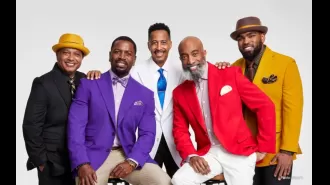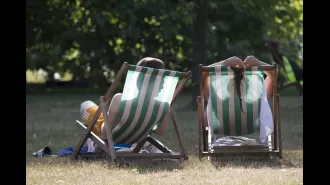"Where do you think I'm from?"
They feel awkward, same as the person asked does.
August 12th 2023.

Growing up, I always felt different. I was a British Pakistani born and bred in the West Midlands, yet I was often asked the question: ‘But where are you really from?’ It implies that perhaps I don’t belong here, and that my appearance somehow negates my Britishness.
It’s currently South Asian Heritage Month, a time to celebrate and acknowledge the rich, varied cultures from the subcontinent. It’s also a time when I find myself reflecting on my own journey as a South Asian. My mum came to England from Pakistan nearly 40 years ago as an immigrant, and my dad, who is of Scottish-Pakistani origin, grew up here, just like me. Their different backgrounds and experiences add layers to my identity that are rich with complexities and nuances.
I’ve realised that people usually ask the 'where are you really from?' question due to two reasons. The first is because people are curious; it is ok to be curious, as long as you respect my initial answer. The second is because I look ‘different’. My brown skin, thick black curly hair and ethnic features give away that I’m not entirely ‘English’, yet people can’t pinpoint my exact origins because nor do I fit neatly into their preconceived notions of different ethnic groups, such as Pakistanis.
Growing up, I became a target in school. Whenever certain news stories circulated about terrorism, rape or immigration, I became a target. People asked insensitive and offensive questions, such as whether my mum was a letterbox or if my brother was a suicide bomber. It took me many years to become proud of my heritage – and even now it’s something I feel uncomfortable being questioned about.
Research company Wunderman Thompson UK has also undertaken new social media analysis that has revealed the question ‘where are you really from?’ has had over 13,000 mentions and 623million impressions in the last 12 months. East and South Asians account for 22% of the conversations, while Black people make up 30%, revealing this is a shared experience primarily among people of colour – and it’s mostly a negative one.
People need to realise it is unacceptable to question someone’s ethnicity based on appearances. Such questioning perpetuates the idea that there is a specific look associated with coming from a particular country – whether that be Pakistan, the UK or anywhere else. The question, ‘Where are you really from?’ is very reductive considering the diversity of our backgrounds and experiences.
Now, to those who ask where I’m ‘really’ from, I ask them a specific, more thought-provoking, question of my own. ‘What do you think a Pakistani looks like?’ Hopefully, this will make them pause, and examine the stereotypes they might unconsciously hold.
In our interconnected world, cultural diversity is a beautiful aspect that enriches our society, but it can also be met with ignorance and insensitivity, even when unintentional. This South Asian Heritage Month, and beyond, let’s break this cycle. So, next time you’re curious about someone’s origins, take a moment to consider the implications of your questions and how they might make someone feel – and please respect their initial answer.
It’s currently South Asian Heritage Month, a time to celebrate and acknowledge the rich, varied cultures from the subcontinent. It’s also a time when I find myself reflecting on my own journey as a South Asian. My mum came to England from Pakistan nearly 40 years ago as an immigrant, and my dad, who is of Scottish-Pakistani origin, grew up here, just like me. Their different backgrounds and experiences add layers to my identity that are rich with complexities and nuances.
I’ve realised that people usually ask the 'where are you really from?' question due to two reasons. The first is because people are curious; it is ok to be curious, as long as you respect my initial answer. The second is because I look ‘different’. My brown skin, thick black curly hair and ethnic features give away that I’m not entirely ‘English’, yet people can’t pinpoint my exact origins because nor do I fit neatly into their preconceived notions of different ethnic groups, such as Pakistanis.
Growing up, I became a target in school. Whenever certain news stories circulated about terrorism, rape or immigration, I became a target. People asked insensitive and offensive questions, such as whether my mum was a letterbox or if my brother was a suicide bomber. It took me many years to become proud of my heritage – and even now it’s something I feel uncomfortable being questioned about.
Research company Wunderman Thompson UK has also undertaken new social media analysis that has revealed the question ‘where are you really from?’ has had over 13,000 mentions and 623million impressions in the last 12 months. East and South Asians account for 22% of the conversations, while Black people make up 30%, revealing this is a shared experience primarily among people of colour – and it’s mostly a negative one.
People need to realise it is unacceptable to question someone’s ethnicity based on appearances. Such questioning perpetuates the idea that there is a specific look associated with coming from a particular country – whether that be Pakistan, the UK or anywhere else. The question, ‘Where are you really from?’ is very reductive considering the diversity of our backgrounds and experiences.
Now, to those who ask where I’m ‘really’ from, I ask them a specific, more thought-provoking, question of my own. ‘What do you think a Pakistani looks like?’ Hopefully, this will make them pause, and examine the stereotypes they might unconsciously hold.
In our interconnected world, cultural diversity is a beautiful aspect that enriches our society, but it can also be met with ignorance and insensitivity, even when unintentional. This South Asian Heritage Month, and beyond, let’s break this cycle. So, next time you’re curious about someone’s origins, take a moment to consider the implications of your questions and how they might make someone feel – and please respect their initial answer.
[This article has been trending online recently and has been generated with AI. Your feed is customized.]
[Generative AI is experimental.]
0
0
Submit Comment





